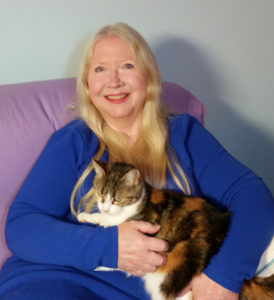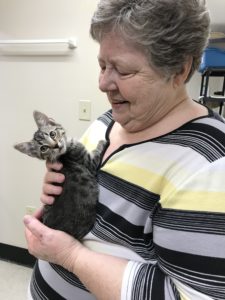A collaborative study out of Athens is trying to determine if having a pet can improve the mental state of older adults. Foster cats are being placed with people 60 and older, and researchers are evaluating the impact of the companionship.
 Research has shown that seniors with pets are 36% less likely to report loneliness than non-pet owners, experience reduced stress, have fewer doctor visits, have reduced blood pressure and risk for heart disease, and develop a sense of purpose that comes with helping a homeless cat.
Research has shown that seniors with pets are 36% less likely to report loneliness than non-pet owners, experience reduced stress, have fewer doctor visits, have reduced blood pressure and risk for heart disease, and develop a sense of purpose that comes with helping a homeless cat.
“Much suffering among older people living alone is the result of boredom, and feelings of helplessness and loneliness,” said Dr. Sherry Sanderson, an associate professor at the University of Georgia College of Veterinary Medicine, who is conducting the study. “Animal companionship is a known antidote to loneliness.”
 The Foster Cat Research Study is a collaboration between the College of Veterinary Medicine, the Augusta University/University of Georgia Medical Partnership, UGA College of Public Health, UGA’s Institute of Gerontology, Athens Community Council on Aging, Athens Area Humane Society and Campus Cats Rescue. This study is funded by the Human Animal Bond Research Institute, with supplemental support from Purina PetCare.
The Foster Cat Research Study is a collaboration between the College of Veterinary Medicine, the Augusta University/University of Georgia Medical Partnership, UGA College of Public Health, UGA’s Institute of Gerontology, Athens Community Council on Aging, Athens Area Humane Society and Campus Cats Rescue. This study is funded by the Human Animal Bond Research Institute, with supplemental support from Purina PetCare.
Researchers began recruiting volunteers in January 2018, and the study will continue into 2020. Data will be collected and analyzed for an additional 12 months after the study concludes. Each volunteer participates in the study for four months, and the adults can choose to adopt their foster cat or allow them to be adopted by someone else.
 All cats come spayed/neutered, vaccinated, dewormed, treated for fleas and microchipped. Cat supplies, litter and food are provided free of charge during the study.
All cats come spayed/neutered, vaccinated, dewormed, treated for fleas and microchipped. Cat supplies, litter and food are provided free of charge during the study.
Dr. Don Scott, site clerkship director of geriatrics and palliative care at the AU/UGA Medical Partnership, is the geriatrician on the study, and he hopes they see a transformation in the adults. “In my experience in working with older adults, and as an animal lover myself, the importance of their relationship with their animal companions, their pets, has always been extremely important,” said Scott. “For many, especially those older adults who live alone, it is the key relationship in their lives, their source of love and caring, and their bond to allow their own expression of love and caring. Older adults’ pets are often the most important thing in their lives.”
 Sanderson said not only do the adults gain to see benefits from this study, the cats do as well.
Sanderson said not only do the adults gain to see benefits from this study, the cats do as well.
“Fostering cats provides a much-needed service to the community as some shelters strive to become low kill/no kill shelters and are often in need of foster homes as a way to bridge the time from intake to adoption into a permanent home,” she said.
If you are interested in volunteering in the study or would just like to know more, please contact Sherry Sanderson (sherrys@uga.edu) or Don Scott (donscott@uga.edu).


